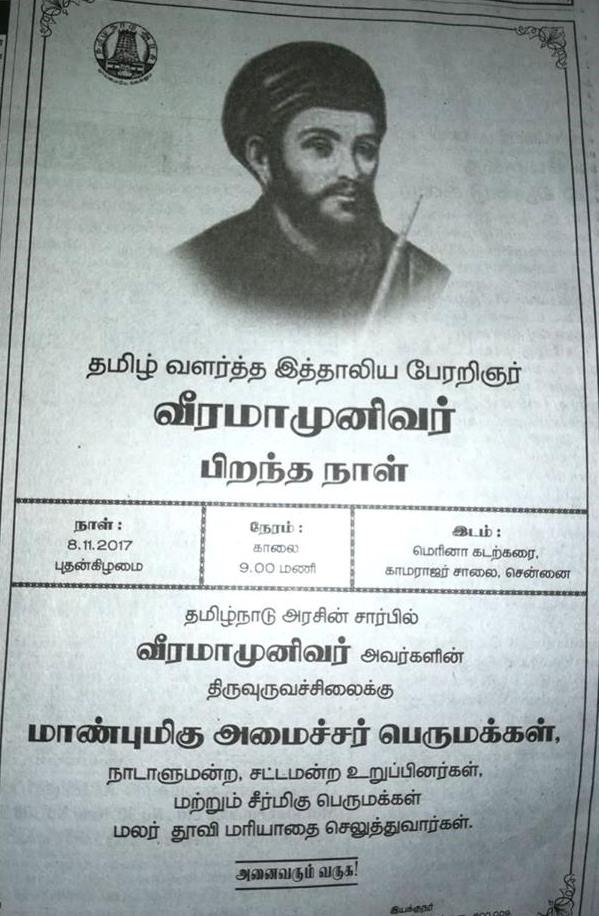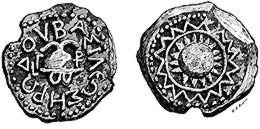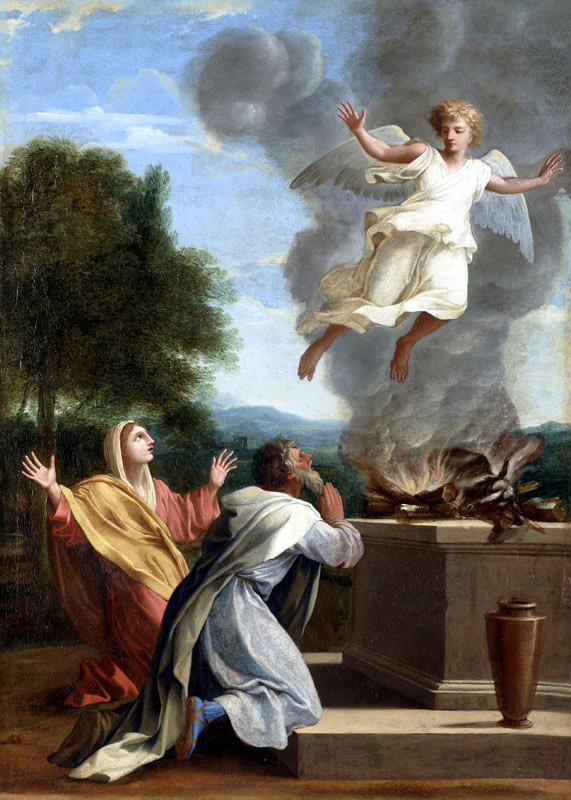|
Thembavani
''Thembavani'' ( ta, தேம்பாவணி; ) is a Tamil classic poetical work by Veeramamunivar ( Costanzo Beschi) on the life of St. Joseph, the earthly father of Jesus Christ. It is divided into thirty-six ''cantos'', containing 3,615 stanzas. Story The poem begins with the birth of Joseph, called Valan. He becomes a staunch ascetic who later marries Mary, a resolute virgin. Through divine intervention, Mary gives birth to a son. The following episodes describe the family's lives. The work ends with Valan's coronation by the Triune God in heavenly glory. Finally, kings from the Holy Roman Empire (England, Ireland, Spain, Gaul, Prussia, Norway, Lusitania, Genoa, Etruria, Parthia, Cyprus, Paeonia) come to Vienna at the invitation of Leopold I to install the statue of the hero of the epic. ''Thembavani'' has more than 100 references to events and teachings in the Bible. It has an abundance of historical, biblical and fictional characters, including Moses, Joshua, ... [...More Info...] [...Related Items...] OR: [Wikipedia] [Google] [Baidu] |
Veeramamunivar
Constantine Joseph Beschi (8 November 1680 – 4 February 1747), also known under his Tamil name of ''Vīramāmunivar'', was an Italian Jesuit priest, missionary in South India, and Tamil language littérateur. Early years Born in Castiglione delle Stiviere, in the district of Mantua, in Italy, on 8 November 1680, Beschi got his secondary education in the Jesuits' High School at Mantua, which taught rhetoric, humanities and grammar. After becoming a Jesuit in 1698, he was trained in Ravenna and Bologna, studying philosophy for three years from 1701–1703 in Bologna, and theology for four years from 1706–1710. His studies also included Latin, French, Portuguese, Greek, and Hebrew. He was ordained as a priest in 1709. On hearing about the work done in India by the Jesuits returning to Italy from India, Beschi was eager to come to India. He requested and obtained permission from Superior General Michelangelo Tamburini to be sent to the Jesuit mission at Madurai in South India ... [...More Info...] [...Related Items...] OR: [Wikipedia] [Google] [Baidu] |
Constanzo Beschi
Constantine Joseph Beschi (8 November 1680 – 4 February 1747), also known under his Tamil name of ''Vīramāmunivar'', was an Italian Jesuit priest, missionary in South India, and Tamil language littérateur. Early years Born in Castiglione delle Stiviere, in the district of Mantua, in Italy, on 8 November 1680, Beschi got his secondary education in the Jesuits' High School at Mantua, which taught rhetoric, humanities and grammar. After becoming a Jesuit in 1698, he was trained in Ravenna and Bologna, studying philosophy for three years from 1701–1703 in Bologna, and theology for four years from 1706–1710. His studies also included Latin, French, Portuguese, Greek, and Hebrew. He was ordained as a priest in 1709. On hearing about the work done in India by the Jesuits returning to Italy from India, Beschi was eager to come to India. He requested and obtained permission from Superior General Michelangelo Tamburini to be sent to the Jesuit mission at Madurai in South In ... [...More Info...] [...Related Items...] OR: [Wikipedia] [Google] [Baidu] |
Tamil Literature
Tamil literature has a rich and long literary tradition spanning more than two thousand years. The oldest extant works show signs of maturity indicating an even longer period of evolution. Contributors to the Tamil literature are mainly from Tamil people from South India, including the land now comprising Tamil Nadu, Kerala, Sri Lankan Tamil people, Eelam Tamils from Sri Lanka, as well as the Tamil diaspora. The history of Tamil literature follows the history of Tamil Nadu, closely following the social, economical, political and cultural trends of various periods. The early Sangam Literature, Sangam literature, dated before 300 BCE, contain anthologies of various poets dealing with many aspects of life, including love, war, social values and religion.Akananuru (1, 15, 31, 55, 61, 65, 91, 97, 101, 115, 127, 187, 197, 201, 211, 233, 251, 265, 281, 311, 325, 331, 347, 349, 359, 393, 281, 295), Kurunthogai (11), and Natrinai (14, 75) are dated before 300 BCE. This was followed by t ... [...More Info...] [...Related Items...] OR: [Wikipedia] [Google] [Baidu] |
Vienna
en, Viennese , iso_code = AT-9 , registration_plate = W , postal_code_type = Postal code , postal_code = , timezone = CET , utc_offset = +1 , timezone_DST = CEST , utc_offset_DST = +2 , blank_name = Vehicle registration , blank_info = W , blank1_name = GDP , blank1_info = € 96.5 billion (2020) , blank2_name = GDP per capita , blank2_info = € 50,400 (2020) , blank_name_sec1 = HDI (2019) , blank_info_sec1 = 0.947 · 1st of 9 , blank3_name = Seats in the Federal Council , blank3_info = , blank_name_sec2 = GeoTLD , blank_info_sec2 = .wien , website = , footnotes = , image_blank_emblem = Wien logo.svg , blank_emblem_size = Vienna ( ; german: Wien ; ... [...More Info...] [...Related Items...] OR: [Wikipedia] [Google] [Baidu] |
Herod The Great
Herod I (; ; grc-gre, ; c. 72 – 4 or 1 BCE), also known as Herod the Great, was a History of the Jews in the Roman Empire, Roman Jewish client state, client king of Judea, referred to as the Herodian Kingdom of Judea, Herodian kingdom. He is known for his colossal building projects throughout Judea, including his renovation of the Second Temple#Herod's Temple, Second Temple in Jerusalem and the expansion of the Temple Mount towards its north, the enclosure around the Cave of the Patriarchs in Hebron, the construction of the port at Caesarea Maritima, the fortress at Masada, and Herodium. Vital details of his life are recorded in the works of the 1st century CE Roman–Jewish historian Josephus. Herod also appears in the Christian Gospel of Matthew as the ruler of Judea who orders the Massacre of the Innocents at the time of the Nativity of Jesus, birth of Jesus, although most Herod biographers do not believe that this event occurred. Despite his successes, including singleh ... [...More Info...] [...Related Items...] OR: [Wikipedia] [Google] [Baidu] |
John The Baptist
John the Baptist or , , or , ;Wetterau, Bruce. ''World history''. New York: Henry Holt and Company. 1994. syc, ܝܘܿܚܲܢܵܢ ܡܲܥܡܕ݂ܵܢܵܐ, Yoḥanān Maʿmḏānā; he, יוחנן המטביל, Yohanān HaMatbil; la, Ioannes Baptista; cop, ⲓⲱⲁⲛⲛⲏⲥ ⲡⲓⲡⲣⲟⲇⲣⲟⲙⲟⲥ or ; ar, يوحنا المعمدان; myz, ࡉࡅࡄࡀࡍࡀ ࡌࡀࡑࡁࡀࡍࡀ, Iuhana Maṣbana. The name "John" is the Anglicized form, via French, Latin and then Greek, of the Hebrew, "Yochanan", which means "God in Christianity, YHWH is gracious"., group="note" ( – ) was a mission preacher active in the area of Jordan River in the early 1st century AD. He is also known as John the Forerunner in Christianity, John the Immerser in some Baptists, Baptist Christianity, Christian traditions, and John the Baptist in Islam, Prophet Yahya in Islam. He is sometimes alternatively referred to as John the Baptiser. John is mentioned by the History of the Jews in the Roman ... [...More Info...] [...Related Items...] OR: [Wikipedia] [Google] [Baidu] |
Nebuchadnezzar
Nebuchadnezzar II ( Babylonian cuneiform: ''Nabû-kudurri-uṣur'', meaning "Nabu, watch over my heir"; Biblical Hebrew: ''Nəḇūḵaḏneʾṣṣar''), also spelled Nebuchadrezzar II, was the second king of the Neo-Babylonian Empire, ruling from the death of his father Nabopolassar in 605 BC to his own death in 562 BC. Historically known as Nebuchadnezzar the Great, he is typically regarded as the empire's greatest king. Nebuchadnezzar remains famous for his military campaigns in the Levant, for his construction projects in his capital, Babylon, and for the important part he played in Jewish history. Ruling for 43 years, Nebuchadnezzar was the longest-reigning king of the Chaldean dynasty. At the time of his death, Nebuchadnezzar was among the most powerful rulers in the world. Possibly named after his grandfather of the same name, or after Nebuchadnezzar I ( 1125–1104 BC), one of Babylon's greatest ancient warrior-kings, Nebuchadnezzar II already secured renown for h ... [...More Info...] [...Related Items...] OR: [Wikipedia] [Google] [Baidu] |
Goliath
Goliath ( ) ''Goləyāṯ''; ar, جُليات ''Ǧulyāt'' (Christian term) or (Quranic term). is a character in the Book of Samuel, described as a Philistine giant defeated by the young David in single combat. The story signified King Saul's unfitness to rule, as Saul himself should have fought for Israel. Scholars today believe that the original listed killer of Goliath was Elhanan, son of Jair, and that the authors of the Deuteronomic history changed the original text to credit the victory to the more famous character David. The phrase "David and Goliath" has taken on a more popular meaning denoting an underdog situation, a contest wherein a smaller, weaker opponent faces a much bigger, stronger adversary. "used to describe a situation in which a small or weak person or organization tries to defeat another much larger or stronger opponent: ''The game looks like it will be a David and Goliath contest.''" Biblical account The Goliath narrative in 1 Samuel 17 Saul and the ... [...More Info...] [...Related Items...] OR: [Wikipedia] [Google] [Baidu] |
David
David (; , "beloved one") (traditional spelling), , ''Dāwūd''; grc-koi, Δαυΐδ, Dauíd; la, Davidus, David; gez , ዳዊት, ''Dawit''; xcl, Դաւիթ, ''Dawitʿ''; cu, Давíдъ, ''Davidŭ''; possibly meaning "beloved one". was, according to the Hebrew Bible, the third king of the United Kingdom of Israel. In the Books of Samuel, he is described as a young shepherd and harpist who gains fame by slaying Goliath, a champion of the Philistines, in southern Canaan. David becomes a favourite of Saul, the first king of Israel; he also forges a notably close friendship with Jonathan, a son of Saul. However, under the paranoia that David is seeking to usurp the throne, Saul attempts to kill David, forcing the latter to go into hiding and effectively operate as a fugitive for several years. After Saul and Jonathan are both killed in battle against the Philistines, a 30-year-old David is anointed king over all of Israel and Judah. Following his rise to power, D ... [...More Info...] [...Related Items...] OR: [Wikipedia] [Google] [Baidu] |
Samson
Samson (; , '' he, Šīmšōn, label= none'', "man of the sun") was the last of the judges of the ancient Israelites mentioned in the Book of Judges (chapters 13 to 16) and one of the last leaders who "judged" Israel before the institution of the monarchy. He is sometimes considered as an Israelite version of the popular Near Eastern folk hero also embodied by the Sumerian Enkidu and the Greek Heracles. The biblical account states that Samson was a Nazirite, and that he was given immense strength to aid him against his enemies and allow him to perform superhuman feats, including slaying a lion with his bare hands and massacring an entire army of Philistines using only the jawbone of a donkey. However, if Samson's long hair were cut, then his Nazirite vow would be violated and he would lose his strength. Samson is betrayed by his lover Delilah, who, sent by the Philistines officials to entice him, orders a servant to cut his hair while he is sleeping and turns him ove ... [...More Info...] [...Related Items...] OR: [Wikipedia] [Google] [Baidu] |
Old Testament
The Old Testament (often abbreviated OT) is the first division of the Christian biblical canon, which is based primarily upon the 24 books of the Hebrew Bible or Tanakh, a collection of ancient religious Hebrew writings by the Israelites. The second division of Christian Bibles is the New Testament, written in the Koine Greek language. The Old Testament consists of many distinct books by various authors produced over a period of centuries. Christians traditionally divide the Old Testament into four sections: the first five books or Pentateuch (corresponds to the Jewish Torah); the history books telling the history of the Israelites, from their conquest of Canaan to their defeat and exile in Babylon; the poetic and "Wisdom books" dealing, in various forms, with questions of good and evil in the world; and the books of the biblical prophets, warning of the consequences of turning away from God. The books that compose the Old Testament canon and their order and names differ be ... [...More Info...] [...Related Items...] OR: [Wikipedia] [Google] [Baidu] |
Joseph
Joseph is a common male given name, derived from the Hebrew Yosef (יוֹסֵף). "Joseph" is used, along with "Josef", mostly in English, French and partially German languages. This spelling is also found as a variant in the languages of the modern-day Nordic countries. In Portuguese and Spanish, the name is "José". In Arabic, including in the Quran, the name is spelled '' Yūsuf''. In Persian, the name is "Yousef". The name has enjoyed significant popularity in its many forms in numerous countries, and ''Joseph'' was one of the two names, along with ''Robert'', to have remained in the top 10 boys' names list in the US from 1925 to 1972. It is especially common in contemporary Israel, as either "Yossi" or "Yossef", and in Italy, where the name "Giuseppe" was the most common male name in the 20th century. In the first century CE, Joseph was the second most popular male name for Palestine Jews. In the Book of Genesis Joseph is Jacob's eleventh son and Rachel's first son, ... [...More Info...] [...Related Items...] OR: [Wikipedia] [Google] [Baidu] |







